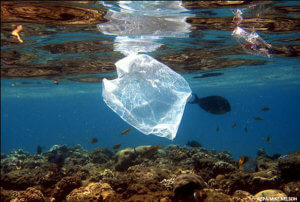From Guest Blogger Bobbi Peterson: Seven Ways You Could Be Unknowingly Harming the Environment

You could be unknowing harming the environment just by doing ordinary, everyday tasks.
Caring for Your Skin
Washing your face to remove dirt, makeup and dead skin cells is just good personal hygiene, but some ways of doing so harms the environment. How? The ingredients in the facial scrub you use can be harmful not only to your skin but also to wildlife.
If your face scrub contains tiny micro beads you can be killing marine life. The small beads are tiny enough to escape the sewers filtering system and end up in the seas. Fish and other marine life can swallow the beads.
Since skin care is important, you can’t stop exfoliating. Instead of buying micro bead scrubs, exfoliate your skin using natural products. Make your own facial scrubs using sugar, oats, baking soda, coffee ground and salts instead of the harmful beads.
Having a Period
Women of childbearing age must use sanitary products during that time of the month. Sanitary napkins and tampons do have a negative impact on the environment in a couple of ways. The disposal of these products and the manufacturing process both have negative environmental consequences.
Women have to practice proper hygiene during their periods. Are there environmentally-friendly alternatives? Yes. The menstrual cup and organic or reusable pads are good options.
Caring for a Pet
Pets are part of the family, and they depend on their owners for care. This includes taking them out for walks and keeping them clean and pest free.
You pick up your pet’s waste while out walking, but what do you use to dispose of it? Plastic bags? Plastic bags are wreaking havoc on our planet. You can’t stop your dog from eliminating waste, but you do have some alternatives for poop disposal.
Giving your pet a bath also negatively impacts the environment, but they need baths to stay healthy. You use a lot of water while washing your pet, and some dog shampoos can be toxic to the environment.
A good alternative is an environmentally-friendly pet wash station. Pet wash stations use less water than washing your dog at home. They also offer non-toxic cleansing products that are safe for your pet and the environment.
Washing Your Car
If you like to save money by washing your car at home, you aren’t being kind to the environment. Washing the car with a running water hose in one hand and a scrubbing sponge in the other is a waste of water.
While rinsing your car, you not only remove detergents that contain phosphates, sulfuric and hydrochloric acids and naphthalene but also car grime that is bad for the environment, like oil, transmission fluid and antifreeze. This runoff and end up hurting the ecosystem.
One alternative to consider is using a car wash. Find one that limits water usage and offers non-toxic cleanser and solutions.
If you must wash your car at home, take steps to limit the negative impact on the environment.
- Don’t allow the hose to run while you wash your car.
- Use a bucket of soapy water and wash and rinse one side of the care at a time.
- Pour dirty water down the toilet or drain so it ends up at a water treatment facility.
- Use non-toxic detergents and reusable sponges.
- Wash your car on gravel or the lawn to absorb water and limit water runoff.
Using Bleach
Chlorine bleach is good at helping get your clothes cleaner and whiter, but it’s harmful to the environment. Bleach can leave your washing machine during the rinse cycle and end up polluting water by mixing with other minerals to become toxic and harmful to wildlife.
Instead of using bleach, try adding ½ cup of baking soda to your wash cycle or some other greener alternatives.
Throwing Batteries Away
Batteries that are thrown in the trash end up in landfills. Throwing a few batteries in the trash may not seem harmful until you see the statistics. About 125,000 tons of batteries are thrown out annually in the US. This is a problem because batteries contain mercury and other toxic chemicals that build up in landfills and leak into groundwater. These toxins can harm people and wildlife.
What steps can you take to reduce batteries in landfills? There are some good alternatives:
- Buy rechargeable batteries if you can.
- Look for ways to limit the batteries you use.
- Find stores that have battery recycling boxes for customer use.
Using Your Garbage Disposal
Getting rid of food wastes by using a garbage disposal is a better alternative than just throwing this waste in the trash, but there are greener alternatives. Sending your food down the disposal not only uses a great deal of water but also energy that affects the environment.
So what can you do? Compost your food waste or try not to create it in the first place. Another alternative is to invest in an environmentally-friendly food disposal system.
Even if you are doing all you can to help save the environment, you may realize that some common practices and tasks are actually doing harm. The best way to reduce your carbon footprint is educating yourself and spreading that knowledge to others.

yes, very good post. I agree with you. Many little thing we do maybe harm the environment. However, protecting environment is so important. And I expect more good articles.
So many ways we can do to reduce pollution to environment. Thanks you sharing. From now on, i will take actions as you suggested.